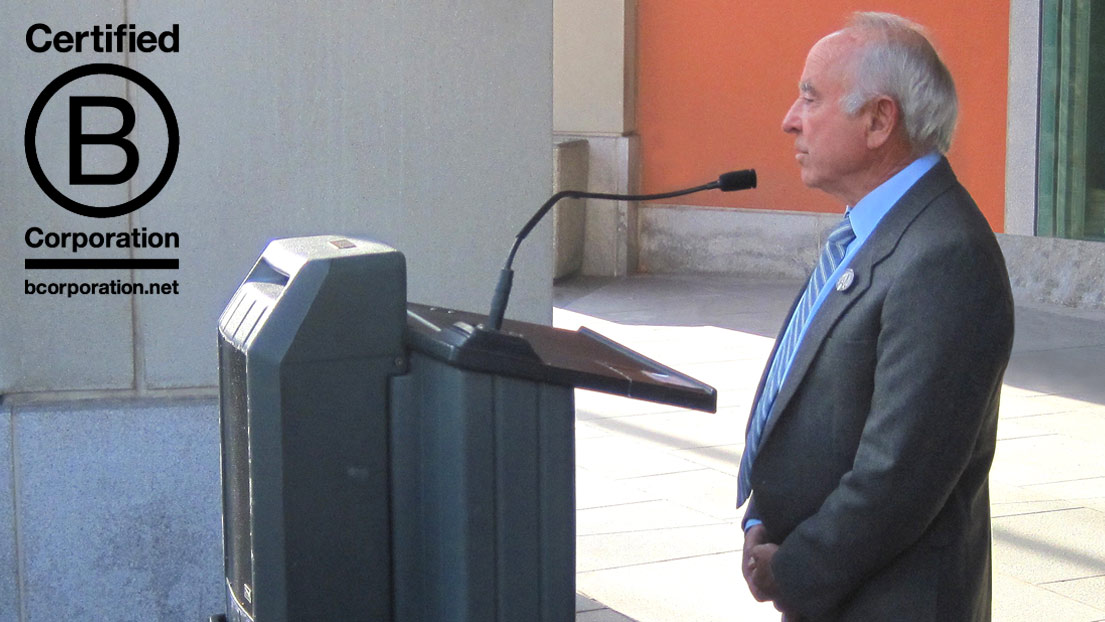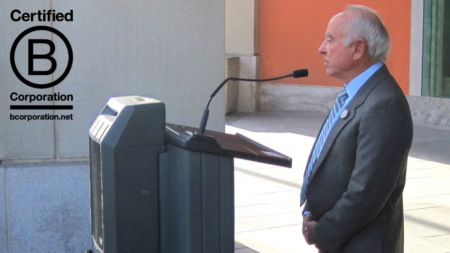Benefit Corporation Update: Patagonia Passes B Impact Assessment, Improves Score to 116

Patagonia has a passion for the outdoors. We aspire to make the best products for the most committed athletes, all the while trying to minimize our impact on the earth and the communities that inhabit it. It can be challenging at times for us to clearly convey how this passion for the outdoors is so closely linked to our business, the products we make and the environmental initiatives we pursue. Ultimately, it is important to us that Patagonia plays a role in preserving our natural resources and the connections that humans have to the earth. We strive to accomplish this to the best of our ability and maintain a level of transparency about the impacts caused by our operations.
To formalize these efforts and legally preserve our values in Patagonia’s business framework for the future, we became a B Corp in December 2011 with certification from B Lab. Additionally, in January 2012, we amended our articles of incorporation to adopt a commitment to sustainability and treating workers well, and registered our business in California as a Benefit Corporation. California is one of twenty-seven states that permit companies to designate an explicit social or environmental mission, and create a legally binding fiduciary responsibility to take into account the interests of workers, the community and the environment as well as its shareholders. Patagonia founder Yvon Chouinard explains: “Benefit Corporation legislation creates the legal framework to enable mission-driven companies like Patagonia to stay mission-driven through succession, capital raises, and even changes in ownership, by institutionalizing the values, culture, processes, and high standards put in place by founding entrepreneurs.”
Video: Patagonia ambassador Dan Ross talks about why he supports B Corps.
To maintain our status as a Benefit Corporation (according to the State of California’s requirements) and our status as a B Corp (according to B Lab’s requirements) we recently completed our second official B Impact Assessment, a biannual requirement for B Lab. The minimum score for B Corp certification is 80 out of 200 points. We are excited to share that we improved on our 2011 score, going from 107 to 116 in 2014. B Lab spent a day visiting Patagonia’s Ventura headquarters in September 2014 to verify our score through an on-site audit.
Through B Lab’s assessment process, we’ve learned a lot about how to improve as a business. We’ve also learned that B Lab’s assessment is tough! We achieved 58% of the total possible score, and we work hard to be a responsible company. We did well in some areas and have room for improvement in others. Below, we’ve summarized the areas of our work that B Lab highlighted as “Best Practices” and those where we have opportunities to improve.
Patagonia’s Best Practices
- Leadership and creativity: Patagonia provides consumers with products that embody the highest standards in sustainable sourcing and publically shares values with stakeholders. Further, Patagonia is leading in terms of creative and action-oriented stakeholder initiatives, through their Environmental Grants Program and campaigns that raise awareness about pressing environmental issues and how to address them.
- Supply chain: Patagonia’s commitment to source the most environmentally responsible materials available (or to create them, as needed) extends beyond the product and into the supply chain itself. As of 2014, all suppliers have been asked to complete an annual social or environmental audit with training provided to those performing at the lowest tiers. New suppliers also receive a pre-screen on social and environmental performance and Patagonia’s Social and Environmental Responsibility Team has the power to veto placing an order at a factory based on those standards.
- Employee culture: The environment at Patagonia encourages work-life balance, as well as a focus on an individual’s physical and mental health. The company provides a variety of exercise class options as well as on-site child care at the Ventura office. In addition, Patagonia’s Environmental Internship Program, which supports both the professional and personal growth of all retail and non-retail team members, further supports environmental causes.
Patagonia’s Opportunities for Improvement
- Formalize environmental metrics data collection: Patagonia should develop comprehensive systems for collecting environmental impact metrics (water use, waste, energy use and CO2 emissions) for corporate and supply chain operations as well as integrate more life cycle assessment measurements into data collection practices.
- Formalize internal operational policies: It is recommended that Patagonia create a formal policy regarding Board of Director operations and a formal Patagonia purchasing policy that incorporates a preference for purchasing from local businesses.
- Supply chain wage metrics: Patagonia should monitor the cost of materials that have the potential to be Fair Trade Certified against the volume of materials that are purchased in a Fiscal Year.
Like all businesses, we face unique and specific challenges based on the size of our business, the scope of the products we make and the depth of our supply chain. These are difficult challenges. We are proud of our score of 116 but know we can do better and have already started developing plans to improve on the results of our B Impact Assessment.
The movement is growing, and becoming a B Corp, though challenging, isn’t as difficult as you may think. At the time of writing there are 1,128 B Corps across 35 countries, representing 121 industries. B Corps are even receiving praise from traditional media outlets. In an op-ed from July 2014, New York Times columnist David Brooks said, “B Corporations are a way to transcend the contradictions between the ineffective parts of the social sector and myopic capitalism.” Patagonia is excited to be a part of this effort and what it represents for our business, our employees and our customers. We are inspired by the growth of the B Corp community and hope that our story helps to inspire others. We look forward to hearing your thoughts on our work.

Elissa Loughman is Manager of Product Responsibility for Patagonia. She works on special projects related to Corporate Responsibility and Environmental Assessment.
